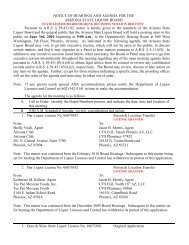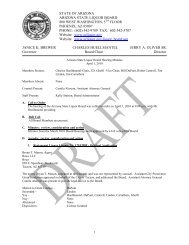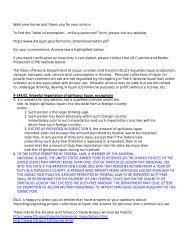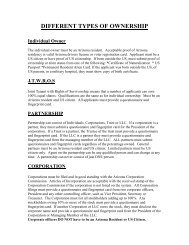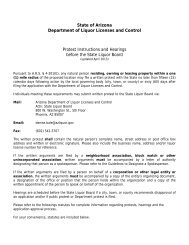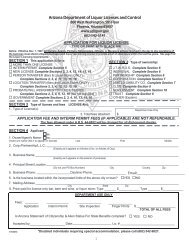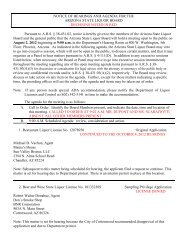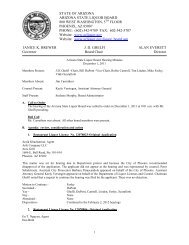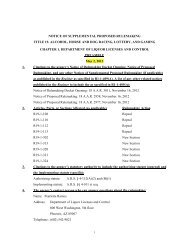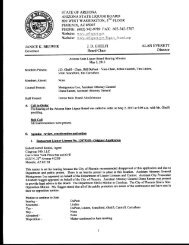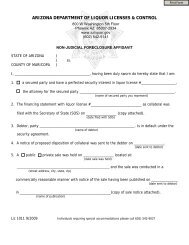Title 4 Law Book - Arizona Department of Liquor Licenses and Control
Title 4 Law Book - Arizona Department of Liquor Licenses and Control
Title 4 Law Book - Arizona Department of Liquor Licenses and Control
Create successful ePaper yourself
Turn your PDF publications into a flip-book with our unique Google optimized e-Paper software.
was the basis for the felony conviction must have been engaged in, authorized, solicited, comm<strong>and</strong>ed or recklessly<br />
tolerated by the directors <strong>of</strong> the corporation or by a high managerial agent acting within the scope <strong>of</strong> employment.<br />
9. The licensee or controlling person violates or fails to comply with this title, any rule adopted pursuant to<br />
this title or any liquor law <strong>of</strong> this state or any other state.<br />
10. The licensee fails to take reasonable steps to protect the safety <strong>of</strong> a customer <strong>of</strong> the licensee entering,<br />
leaving or remaining on the licensed premises when the licensee knew or reasonably should have known <strong>of</strong> the<br />
danger to such person, or the licensee fails to take reasonable steps to intervene by notifying law enforcement<br />
<strong>of</strong>ficials or otherwise to prevent or break up an act <strong>of</strong> violence or an altercation occurring on the licensed premises<br />
or immediately adjacent to the premises when the licensee knew or reasonably should have known <strong>of</strong> such acts <strong>of</strong><br />
violence or altercations.<br />
11. The licensee or controlling person lacks good moral character.<br />
12. The licensee or controlling person knowingly associates with a person who has engaged in racketeering,<br />
as defined in section 13-2301, or WHO has been convicted <strong>of</strong> a felony, <strong>and</strong> the association is <strong>of</strong> such a nature as to<br />
create a reasonable risk that the licensee will fail to conform to the requirements <strong>of</strong> this title or <strong>of</strong> any criminal<br />
statute <strong>of</strong> this state.<br />
B. For the purposes <strong>of</strong>:<br />
1. Subsection A, paragraph 8 <strong>of</strong> this section, "high managerial agent" means an <strong>of</strong>ficer <strong>of</strong> a corporation or<br />
any other agent <strong>of</strong> the corporation in a position <strong>of</strong> comparable authority with respect to the formulation <strong>of</strong> corporate<br />
policy.<br />
2. Subsection A, paragraphs 9 <strong>and</strong> 10 <strong>of</strong> this section, acts or omissions <strong>of</strong> an employee <strong>of</strong> a licensee, which<br />
violate any provision <strong>of</strong> this title or rules adopted pursuant to this title shall be deemed to be acts or omissions <strong>of</strong> the<br />
licensee. Acts or omissions by an employee or licensee committed during the time the licensed premises were<br />
operated pursuant to an interim permit or without a license may be charged as if they had been committed during the<br />
period the premises were duly licensed.<br />
C. The director may suspend, revoke or refuse to issue, transfer or renew a license under this section based<br />
solely on the unrelated conduct or fitness <strong>of</strong> any <strong>of</strong>ficer, director, managing agent or other controlling person if the<br />
controlling person retains any interest in or control <strong>of</strong> the licensee after sixty days following written notice to the<br />
licensee. If the controlling person holds stock in a corporate licensee or is a partner in a partnership licensee, the<br />
controlling person may only divest himself <strong>of</strong> his interest by transferring the interest to the existing stockholders or<br />
partners who must demonstrate to the department that they meet all the requirements for licensure. For the purposes<br />
<strong>of</strong> this subsection, the conduct or fitness <strong>of</strong> a controlling person is unrelated if it would not be attributable to the<br />
licensee.<br />
D. If the director finds, based on clear <strong>and</strong> convincing evidence in the record, that a violation involves the<br />
use by the licensee <strong>of</strong> a drive-through OR WALK-UP SERVICE WINDOW or other physical feature <strong>of</strong> the<br />
licensed premises that allows a customer to purchase spirituous liquor without leaving the customer’s vehicle OR,<br />
WITH RESPECT TO A WALK-UP SERVICE WINDOW THAT PREVENTS THE LICENSEE FROM<br />
FULLY OBSERVING THE CUSTOMER, <strong>and</strong> that the use <strong>of</strong> that drive-through OR WALK-UP SERVICE<br />
WINDOW or other physical feature caused the violation, the director may suspend or terminate the licensee’s use<br />
<strong>of</strong> the drive-through OR WALK-UP SERVICE WINDOW or other physical feature for the sale <strong>of</strong> spirituous<br />
liquor, in addition to any other sanction.<br />
E. The director may refuse to transfer any license or issue a new license at the same location if the director<br />
has filed a complaint against the license or location which has not been resolved alleging a violation <strong>of</strong> any <strong>of</strong> the<br />
grounds set forth in subsection A <strong>of</strong> this section until such time as the complaint has been finally adjudicated.<br />
F. The director shall receive all complaints <strong>of</strong> alleged violations <strong>of</strong> this chapter <strong>and</strong> is responsible for the<br />
investigation <strong>of</strong> all allegations <strong>of</strong> a violation <strong>of</strong>, or noncompliance with, this title, any rule adopted pursuant to this<br />
title or any condition imposed ON the licensee by the license. When the director receives three such complaints<br />
from any law enforcement agency resulting from three separate incidents at a licensed establishment within a<br />
twelve-month period, the director shall transmit a written report to the board setting forth the complaints, the results<br />
<strong>of</strong> any investigation conducted by the law enforcement agency or the department relating to the complaints <strong>and</strong> a<br />
history <strong>of</strong> all prior complaints against the license <strong>and</strong> their disposition. The board shall review the report <strong>and</strong> may<br />
direct the director to conduct further investigation <strong>of</strong> a complaint or to serve a licensee with a complaint <strong>and</strong> notice<br />
<strong>of</strong> a hearing pursuant to subsection G <strong>of</strong> this section.<br />
G. ON the director's initiation <strong>of</strong> an investigation or ON the receipt <strong>of</strong> a complaint <strong>and</strong> an investigation <strong>of</strong><br />
the complaint as deemed necessary, the director may cause a complaint <strong>and</strong> notice <strong>of</strong> a hearing to be directed to the<br />
licensee setting forth the violations alleged against the licensee <strong>and</strong> directing the licensee, within fifteen days after<br />
service <strong>of</strong> the complaint <strong>and</strong> notice <strong>of</strong> a hearing, to appear by filing with the director an answer to the complaint.<br />
31<br />
June 8, 2012




